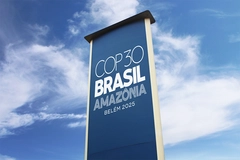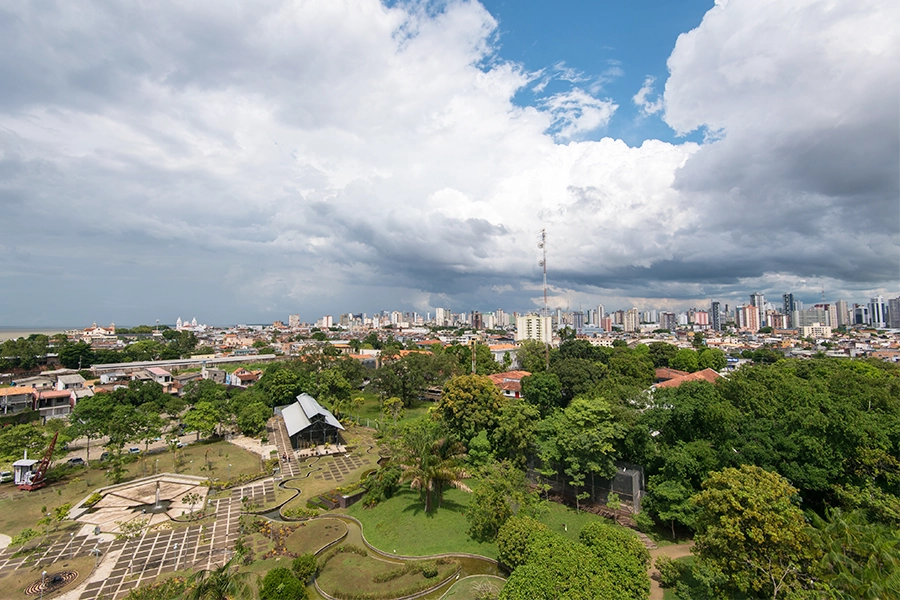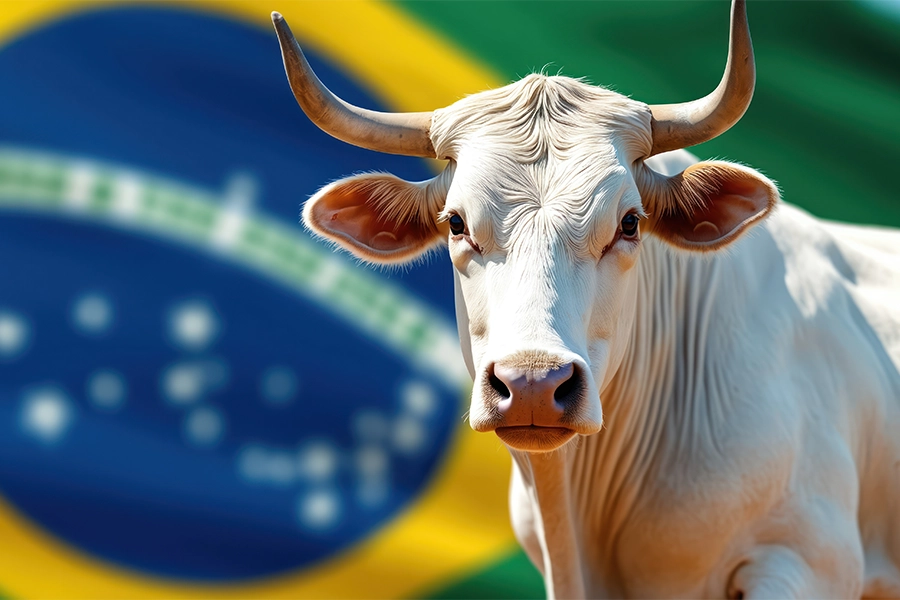
- Industry news
Industry news
- Category news
Category news
- Reports
- Key trends
- Multimedia
- Journal
- Events
- Suppliers
- Home
- Industry news
Industry news
- Category news
Category news
- Reports
- Key trends
- Multimedia
- Events
- Suppliers
Corporate capture or climate collaboration? Brazil launches agribusiness platform at COP30
Key takeaways
- Brazil grants the agriculture sector an unprecedented platform at COP30 with 400 industry-led events, raising corporate capture concerns.
- Despite signing the Global Methane Pledge, Brazil’s climate plan excludes agricultural methane, which comprises 75.6% of national methane emissions.
- Agribusiness lobbies push controversial GWP* metric rejected by IPCC that would eliminate Brazil’s methane reduction requirements while maintaining a large livestock sector.

As COP30 opens in Belém, Brazil, approximately 400 industry-led events will unfold at the AgriZone, a new platform granted to the agriculture sector near the main negotiation venue. The space represents a first in the climate conference’s 30-year history, raising questions about corporate capture of the summit. Brazilian President Lula has branded it the “COP of truth.”
Brazil has positioned transforming agriculture and food systems as the third axis of the COP30 agenda. However, recent research conducted ahead of the event warns that the country’s powerful agribusiness sector is exploiting this opening to position itself as part of the climate solution while systematically avoiding emissions regulations.
Agriculture produces around 32% of human-made methane globally, yet the sector has largely escaped the regulatory scrutiny applied to other major emitters.
“Brazil is the first country to ever grant such space and influence to the agriculture sector,” Nusa Urbancic, chief executive at Changing Markets Foundation (CMF), tells Food Ingredients First. “The AgriZone will be housed inside Embrapa’s headquarters, less than 2 km from the Blue Zone, the main COP30 negotiation venue.”
CMF argues this is evidence that industry lobbying is increasingly influencing political talks and negotiations at the event. This influence also appears to have been pervasive throughout the buildup. Throughout 2025, major meat companies JBS, Marfrig, and Minerva co-sponsored media coverage of COP30 with Brazilian outlets including O Globo and Valor Econômico.
Industry groups hosted journalist workshops on “fair metrics for tropical agriculture,” while conferences positioned Brazilian agribusiness as an “environmental powerhouse.” JBS launched a campaign two weeks before COP30, suggesting it “feeds a better future.”
“Brazil’s agribusiness sector has long branded itself as championing ‘environmental stewardship’ — narratives often reported uncritically in national media,” says Urbancic.
“Multimillion-dollar marketing campaigns portray agribusiness as Brazil’s economic engine, a global food provider, and a modern, inclusive sector central to national identity.” The industry-led AgriZone near COP30’s main venue symbolizes Brazil’s bid to showcase agriculture as a climate solution — even as critics warn of growing corporate influence over the summit’s agenda.
The industry-led AgriZone near COP30’s main venue symbolizes Brazil’s bid to showcase agriculture as a climate solution — even as critics warn of growing corporate influence over the summit’s agenda.
The methane blind spot
To mark the COP30 opening, CMF has unveiled the Methane Action Tracker, which it says is the first interactive platform monitoring agricultural methane emissions across both companies and countries. The tracker reveals that just six countries and the EU have reported small methane reductions, despite 82% of featured countries signing the Global Methane Pledge.
Although Brazil is a signatory to the Global Methane Pledge to cut methane by 30% by 2030, agricultural methane receives no mention in the country’s nationally determined contribution submitted in November 2024, CMF notes. This omission is glaring, given that agriculture accounts for 75.6% of Brazil’s methane emissions.
Brazil has more cattle than people — 238.6 million head compared to 213.4 million population. Enteric fermentation produces 405 million tons of carbon dioxide equivalent annually, more than Italy’s entire economy. In Brazil, methane emissions increased by 6% between 2020 and 2023, with 97% originating from beef and dairy cattle.
Urbancic says these findings do not necessarily impact Brazil’s hosting of COP30. “I still have hopes that Brazil will be a good leader for the conference, and it has presented some promising initiatives, such as the Tropical Forest Forever Facility to reverse the deforestation incentives.”
“However, agricultural methane, another major source of the climate crisis as well as a major opportunity for climate mitigation, will be less on the agenda due to this corporate capture that Big Meat holds over Brazil’s government and climate policies.”
Political capture and weakened policies
The agriculture industry’s influence extends deep into Brazil’s political institutions through the Frente Parlamentar da Agropecuária (FPA) (a cross-spectrum parliamentary front composed of politicians representing corporate landowners), which controls 59% of deputies and 62% of senators.
The Instituto Pensar Agropecuária, funded by 48 business associations including major agribusiness corporations, drafts legislation aligned with the sector’s priorities to aid the FPA.
Asked how this political control translates into influence over Brazil’s negotiating stance at COP30, Urabcic says: “There is a conflict between different parts of the political spectrum in Brazil. A conflict between the rural bloc, which is very pro-Big Ag, and environmentalists might influence the way Brazil will negotiate at COP30.”
Brazil’s Climate Plan has become a battleground with the rural caucus claiming it “punishes those who already produce responsibly.” The Brazilian Emissions Trading System only regulates 30% of national emissions because agricultural emissions are excluded.
Yet meat companies actively seek emissions credits through voluntary carbon markets, highlighting that methods for measuring agricultural emissions exist but are being sidelined to protect industry interests. Brazil’s powerful meat industry positions itself as a sustainability leader at COP30, while new research exposes the methane emissions and policy loopholes it seeks to keep off the table.
Brazil’s powerful meat industry positions itself as a sustainability leader at COP30, while new research exposes the methane emissions and policy loopholes it seeks to keep off the table.
The GWP* controversy
Brazilian industry associations, supported by JBS and other meat giants, are pushing for the adoption of GWP* (Global Warming Potential Star), a controversial metric for measuring methane that the Intergovernmental Panel on Climate Change (IPCC) has explicitly rejected for national climate accounting. The IPCC states that GWP* “does not capture the contribution to warming that each methane emission makes.”
The metric GWP* is an advanced way to measure the warming impact of GHGs that addresses some limitations of the traditional GWP metric.
Traditional GWP compares the cumulative heat-trapping ability of a unit mass of a gas to the same mass of carbon dioxide over a specified time horizon (commonly 20, 100, or 500 years). It helps quantify and compare the impacts of different gases but assumes that gases have a constant warming effect over time and does not fully account for gases with short atmospheric lifetimes, such as methane.
Under current metrics, Brazil would need to cut methane rapidly to meet its reduction target. But if the country switches to GWP*, almost no reductions would be required, potentially allowing Brazil to maintain its large livestock sector and even claim “cooling impacts.”
“The report reveals coordinated efforts by JBS and industry groups to promote the controversial GWP* methane metric, which the IPCC explicitly rejected for national climate accounting,” says Urbancic.
The CMF report also documents how agribusiness has systematically weakened Brazil’s climate policies. Between 2019 and 2024, it shows that properties in Brazil’s Legal Amazon altered their registrations 15,750 times, erasing 4.9 million hectares from official records to remove evidence of deforestation.
JBS has not yet responded for comment.
Food systems at the crossroads
Research shows that even if fossil fuel production stopped immediately, food-related emissions alone could push global warming beyond 1.5°C, with methane as a major driver. Already, 28% of Brazil’s farmland lies beyond optimal climatic conditions, expected to rise to 74% by 2060.
“Agriculture can no longer be treated as ‘exceptional,’” says Urbancic. “Big food companies and big meat and dairy-producing countries have huge resources. These now need to be invested in supporting farmers to cut methane and promoting a shift to healthier diets globally.”
Brazil also has active grassroots movements, with Indigenous leaders and civil society groups challenging industry narratives. The Lula government has made progress toward its goal of “eradicating hunger” through supporting climate-resilient agroecological farming, and has slowed soaring deforestation rates. Over two-thirds of food consumed domestically is produced by Brazil’s small farmers, who control just a quarter of the country’s farmland.
Asked why Brazil’s agroecological farming systems aren’t being centered in COP30’s agriculture agenda, Urbancic says: “Food systems reform is an area delegated to governments. This is an important oversight in climate action. We wanted to highlight a very positive role that Brazil could play on the global stage, if it exported some of its progressive policies that support agroecological family farmers.”










